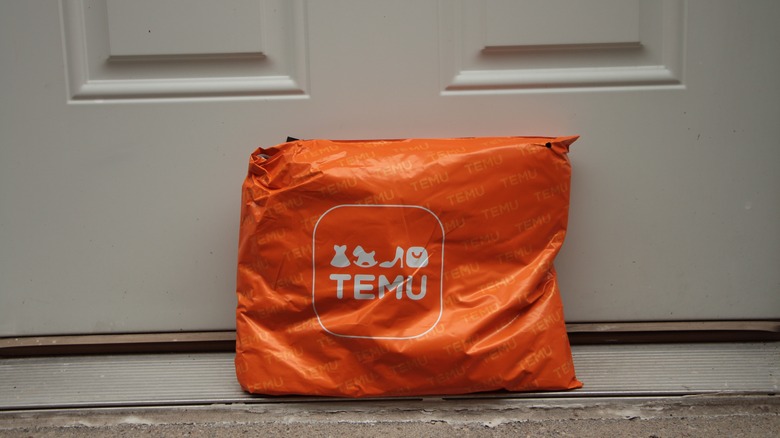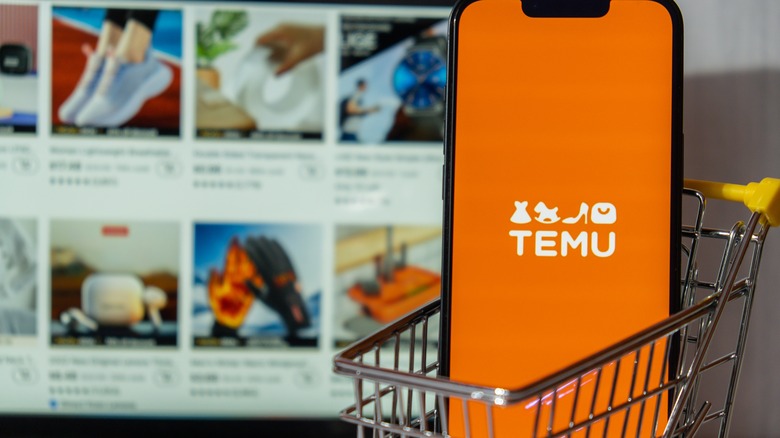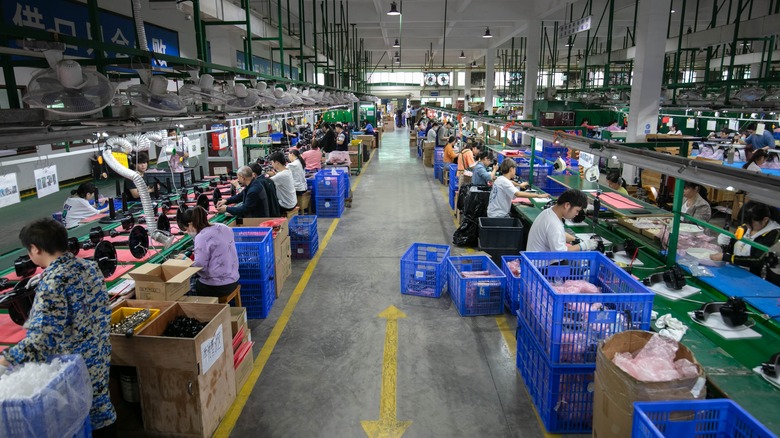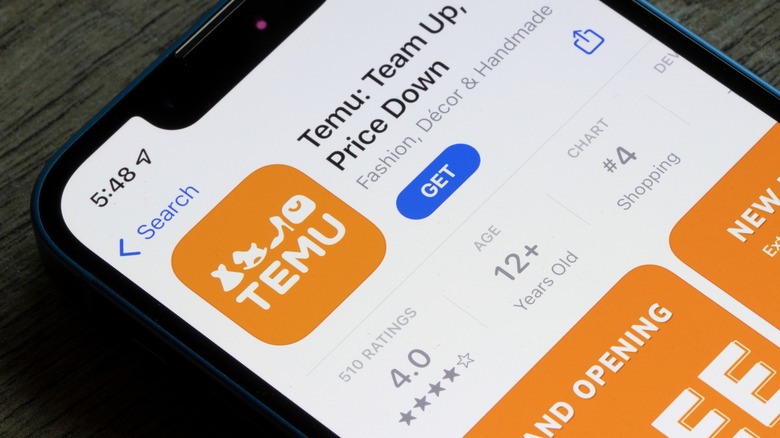The Shady Side Of Temu
Since its launch in 2022, Temu has risen to become one of the most popular and successful online retailers across the world. Owned by Chinese company PDD Holdings, which also owns a similar company called Pinduoduo, it offers a wide range of products at rock-bottom prices. In that sense, it is very much like Shein, another Chinese marketplace that offers bargains to customers.
Temu contends that because it ships directly to consumers and cuts out middlemen, it can keep prices low and give shoppers a better experience. Yet, as you might have guessed, being able to sell its range of products at such low prices isn't quite as straightforward as that. The company has been accused of some rather shady practices and been involved in some controversies you should be aware of before using the app.
Fake goods and quality control have raised concerns
Among the major concerns about Temu are the products that customers can buy from the online retailer. While there have not been any explicit instances of counterfeit items on Temu, the company's sister site Pinduoduo has been accused of selling fake products multiple times. Critics have suggested that the owner may expand this practice to Temu if given the opportunity, meaning customers wouldn't get the items described in listings.
An investigation by the U.S.-China Economic and Security Review Commission found that Temu's business practices raise concerns, particularly in areas such as copyright infringement. As the company doesn't work with established brands or well-known manufacturers, it is easy to sell inferior products that might not hold up when compared to those sold by other retailers, such as Amazon. In addition, Wired found that Temu focuses on making products as cheaply as possible, so there is a chance of getting problematic products from the retailer.
Many designers have accused Temu of stealing their work. According to TIME, almost identical versions of products available on other sites have been found on Temu, and there is often little that people can do to have them removed even though they clearly infringe on intellectual property rights. Even those who do successfully manage to have listings taken down could see them return under a new vendor.
Delivery times can be inconsistent
Temu has exploded in popularity for a variety of reasons, but one of the biggest is its offer of free shipping on almost all of its orders. While users can pay for express delivery if they need items quickly, the standard options won't cost customers anything except the wait to receive their purchases. Items are typically shipped directly from China and are not stored locally, so it can take around one to two weeks for your package to arrive at your door.
At least, that's what is supposed to happen. There have been online many complaints about inconsistent delivery times from Temu and items not being delivered until way after the retailer's estimate. In some cases, customers claim items have failed to be delivered at all or arrived damaged or missing part of the order.
Better Business Bureau public relations and social media director Melanie McGovern explained that the BBB had received many complaints from customers in the U.S. The vast majority of them were focused on the fact that items had not been delivered as promised. Speaking to TIME, she said: "They're making delivery promises, and people aren't getting their stuff when they're supposed to be."
Positive reviews on social media might be paid ads
If you have a social media account or regularly use the internet, you've probably seen Temu advertisements. The retailer has spent a huge amount of money to make people aware of its existence, including two pricey Super Bowl commercials. However, it isn't just traditional advertisements that promote Temu. On apps like TikTok, users can see a wide range of positive reviews about the retailer and the products they have received. Seemingly from everyday people like yourself, these kinds of videos and posts are much more likely to get you to try out Temu for yourself.
The only issue is that these testimonials are not necessarily honest, unsolicited opinions from shoppers — some are likely paid sponsorships with online influencers. Temu offers an influencer program where those posting about the retailer can earn rewards like cash and store credit. In these instances, influencers will often post videos that include overviews of everything they've bought from Temu, along with shots of them trying on clothing or using items before recommending them to their followers.
Knowing that the positive reviews of Temu online may well be part of a marketing campaign — without this fact always being made explicit — might rub some people the wrong way. Yet, for those wondering how the Temu affiliate program works, it's a simple process that involves heading over to the retailer's official website and then submitting an application that will be reviewed by staff.
Temu has received a lot of complaints
A quick glance at the Better Business Bureau page for Temu reveals that the company has received thousands of complaints since it started trading in the U.S. The retailer holds a customer review rating of just 2.5 out of 5 and is rated as C+ by the BBB. Meanwhile, the Federal Trade Commission has received a similar number of complaints during that time, suggesting that many consumers are unhappy with Temu's service.
Most of the complaints seem to center on Temu shipments not arriving on time or going missing, while some also point out that products often arrive damaged or are not complete. Others said they had issues getting a refund. According to The Times, the lack of consumer protections in China allows Temu to circumvent the procedures that would be necessary in the U.S. or the U.K. The return and refund policies on the company's site also give it leeway to avoid giving refunds in many circumstances despite promising a 90-day return period for unsatisfied customers.
Its parent company has been accused of forcing long hours
Temu's parent company, PPD Holdings, has also faced allegations that it overworks employees and forces them to work in poor or unsafe conditions. The vast majority of the investigations carried out to examine how employees are treated have focused on Temu's parent company, which also operates the Chinese-focused online retailer Pinduoduo.
As reported by the U.S.-China Economic and Security Review Commission, a China Labor Watch study found that employees at PDD Holdings were often forced to work continuous overtime. This amounted to workers having to work 380 hours each month. To put that into perspective, it would mean working more than 12 hours every day in a 31-day month without any days off. Per The Guardian, one anonymous employee said Pinduoduo's factory floors are often overcrowded and don't have appropriate facilities for the sheer number of employees. In some cases, this meant having just eight available toilets for over 1,000 individual workers.
Conditions at some Pinduoduo facilities were so bad that protests broke out following the death of two employees in 2021. Two young workers died within two weeks of each other, one ending his own life and the other collapsing in the office where she worked. This prompted customers to boycott the company and led to investigations by government officials.
The U.S. said Temu products are likely to be made using forced labor
Temu has also come under the microscope for its manufacturing process. In 2023, lawmakers in the U.S. warned that there is a strong possibility of a link between Temu and forced labor, particularly of the Chinese Uyghur population. According to a U.S. investigation, there is an "extremely high risk" of products on the Chinese retailer having been made by enslaved people.
While Temu has denied that it uses forced labor, the company relies on third-party sellers for most of its listings, and these separate companies may be utilizing forced labor as part of the manufacturing process. "American consumers should know that there is an extremely high risk that Temu's supply chains are contaminated with forced labor," said a report by the House Select Committee on the Chinese Communist Party. "Temu does not have any system to ensure compliance with the Uyghur Forced Labor Prevention Act (UFLPA)," it claimed elsewhere in the document. "This all but guarantees that shipments from Temu containing products made with forced labor are entering the United States on a regular basis."
The U.K. government has also warned consumers that those ordering from Temu could be unwillingly gaining from the profits of those forced to work against their will. While Temu has denied all claims, authorities have requested the company be more transparent with its supply chain, especially since many of the goods on the site are made in areas where forced labor is known to take place.
The parent company allegedly takes extreme measures against former employees
Considering the allegations of poor working conditions at PPD Holdings and its companies, it would make sense that some employees would want to leave and find new pastures. Unfortunately, evidence indicates that Pinduoduo and PDD Holdings — two companies closely associated with Temu — have been involved in nefarious actions against former employees.
An investigation by the Financial Times found that some workers who decided to leave Pinduoduo were put under surveillance by the company. Some were subsequently taken to court and forced to pay damages after breaking restrictive non-compete agreements they were forced to sign when they started their employment. It is not unusual in these circumstances for the company to order ex-employees to be followed and filmed to ensure that they don't go to work for a rival company.
Similarly, the Wall Street Journal found that PDD Holdings employees are frequently forced to work in isolation to ensure they can't leak information to rivals. The practice is allegedly so restrictive that many colleagues won't even know the names of those they have worked with for several years.
Products reportedly may not be safe to use
In addition to concerns about the quality of products and whether they are genuine, some experts have expressed warnings about the safety of Temu. Temu acts as an online marketplace, in much the same way as Amazon does with its third-party sellers, meaning that it isn't directly involved in the manufacturing process. This means it's possible for products that may be potentially dangerous to find their way onto Temu's website and app.
Some investigations have found that electrical products sold from Temu fail to meet safety regulations. Which? purchased several different brands of heaters in 2024 and found none would be able to be sold legally in the U.K. — and 18 posed a "real safety risk for children." Other items, including chargers for smartphones and other devices, broke during minor usage. Temu has since explained that it takes safety seriously and proactively removes potentially dangerous products when it finds them.
That hasn't stopped other organizations from finding problems with Temu when it comes to safety. Toys Industries of Europe revealed in a report that almost all of the toys sold on Temu break EU safety rules. Some posed choking hazards, while others had the ability to cut, strangle, and puncture. One product even contained a toxic chemical in levels above the legal limit.
Experts have data and privacy concerns
The dangers posed by Chinese-owned apps and websites are in the spotlight now more than ever. Potential problems with firms passing over users' personal information to the Chinese government are being taken extremely seriously by many countries around the world. Most notably, this has led to the possibility of a TikTok ban in the U.S. in the near future. Many of those same concerns about privacy and security are also shared with Temu.
Although there's no hard evidence that Temu is collecting user data, passing it on to other parties, or storing it in an insecure manner, that isn't necessarily the case for some of Temu's sister retailers. For example, Pinduoduo was removed from the Play Store after Google discovered that the app was installing malware on Android phones, allowing the company to spy on users and harvest personal data it should not have access to (per CNN). This has understandably led to fears that Temu could do the same thing.
Temu's business model can encourage scams
Outside of traditional advertising, Temu relies on a rather unique marketing strategy to attract new users and keep established customers coming back. This involves extensive use of referral links and codes as well as mini-games and time-sensitive deals. All of these features are designed to make shopping on Temu a more interactive experience and keep the user's attention.
However, these same tactics make Temu a prime target for scams. These range from scammers offering cosmetic skins and items for games such as "Fortnite" for those who use their referral codes to deep fakes that involve celebrities seemingly endorsing certain products that are available on Temu. Some unscrupulous actors have even offered nude photographs of famous figures in exchange for people signing up so they can receive a cash bonus.
Although Temu isn't behind these scams and doesn't endorse them, the business model can encourage scammers and enable them to take advantage of customers. In a statement to SlashGear, Temu said: "The company is aware of scams impersonating Temu and advises consumers to only download apps from the official Apple App Store and Google Play Store, and be wary of clicking on suspicious links on social media."










